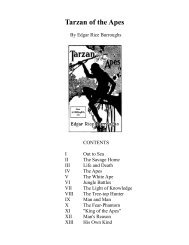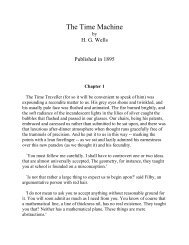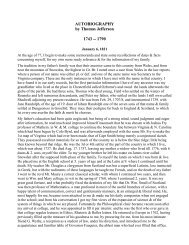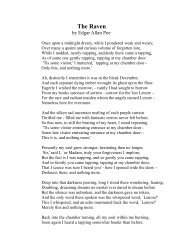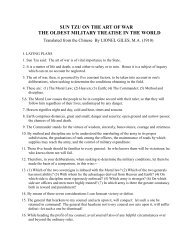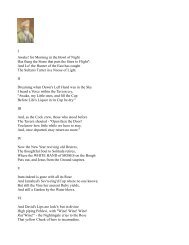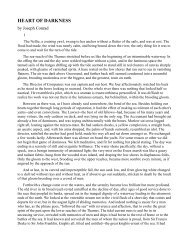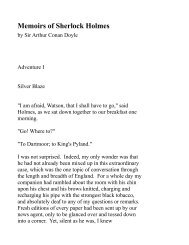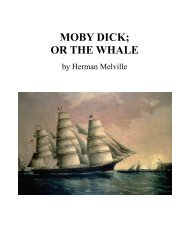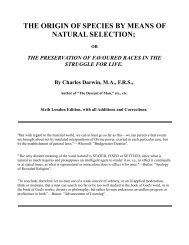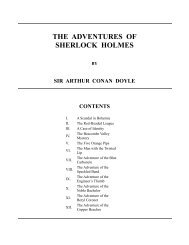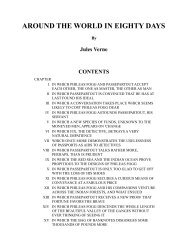memories. <strong>The</strong> bright, gentle, fanciful plays--the ones I like best now--appear not to have impressed meat first, perhaps because they reflected the habitual sunshine and gaiety <strong>of</strong> a child's life. But "there isnothing more capricious than the memory <strong>of</strong> a child: what it will hold, and what it will lose."I have since read Shakespeare's plays many times and know parts <strong>of</strong> them by heart, but I cannot tellwhich <strong>of</strong> them I like best. <strong>My</strong> delight in them is as varied as my moods. <strong>The</strong> little songs and the sonnetshave a meaning for me as fresh and wonderful as the dramas. But, with all my love for Shakespeare, itis <strong>of</strong>ten weary work to read all the meanings into his lines which critics and commentators have giventhem. I used to try to remember their interpretations, but they discouraged and vexed me; so I made asecret compact with myself not to try any more. This compact I have only just broken in my study <strong>of</strong>Shakespeare under Pr<strong>of</strong>essor Kittredge. I know there are many things in Shakespeare, and in the world,that I do not understand; and I am glad to see veil after veil lift gradually, revealing new realms <strong>of</strong>thought and beauty.Next to poetry I love history. I have read every historical work that I have been able to lay my handson, from a catalogue <strong>of</strong> dry facts and dryer dates to Green's impartial, picturesque "History <strong>of</strong> theEnglish People"; from Freeman's "History <strong>of</strong> Europe" to Emerton's "Middle Ages." <strong>The</strong> first book thatgave me any real sense <strong>of</strong> the value <strong>of</strong> history was Swinton's "World History," which I received on mythirteenth birthday. Though I believe it is no longer considered valid, yet I have kept it ever since as one<strong>of</strong> my treasures. From it I learned how the races <strong>of</strong> men spread from land to land and built great cities,how a few great rulers, earthly Titans, put everything under their feet, and with a decisive word openedthe gates <strong>of</strong> happiness for millions and closed them upon millions more: how different nationspioneered in art and knowledge and broke ground for the mightier growths <strong>of</strong> coming ages; howcivilization underwent as it were, the holocaust <strong>of</strong> a degenerate age, and rose again, like the Phoenix,among the nobler sons <strong>of</strong> the North; and how by liberty, tolerance and education the great and the wisehave opened the way for the salvation <strong>of</strong> the whole world.In my college reading I have become somewhat familiar with French and German literature. <strong>The</strong>German puts strength before beauty, and truth before convention, both in life and in literature. <strong>The</strong>re isa vehement, sledge-hammer vigour about everything that he does. When he speaks, it is not to impressothers, but because his heart would burst if he did not find an outlet for the thoughts that burn in hissoul.<strong>The</strong>n, too, there is in German literature a fine reserve which I like; but its chief glory is the recognitionI find in it <strong>of</strong> the redeeming potency <strong>of</strong> woman's self-sacrificing love. This thought pervades allGerman literature and is mystically expressed in Goethe's "Faust":All things transitory But as symbols are sent. Earth's insufficiency Here grows to event. <strong>The</strong>indescribable Here it is done. <strong>The</strong> Woman Soul leads us upward and on!Of all the French writers that I have read, I like Moliere and Racine best. <strong>The</strong>re are fine things inBalzac and passages in Merimee which strike one like a keen blast <strong>of</strong> sea air. Alfred de Musset isimpossible! I admire Victor Hugo--I appreciate his genius, his brilliancy, his romanticism; though he isnot one <strong>of</strong> my literary passions. But Hugo and Goethe and Schiller and all great poets <strong>of</strong> all greatnations are interpreters <strong>of</strong> eternal things, and my spirit reverently follows them into the regions whereBeauty and Truth and Goodness are one.I am afraid I have written too much about my book-friends, and yet I have mentioned only the authors Ilove most; and from this fact one might easily suppose that my circle <strong>of</strong> friends was very limited andundemocratic, which would be a very wrong impression. I like many writers for many reasons--Carlylefor his ruggedness and scorn <strong>of</strong> shams; Wordsworth, who teaches the oneness <strong>of</strong> man and nature; I findan exquisite pleasure in the oddities and surprises <strong>of</strong> Hood, in Herrick's quaintness and the palpable
scent <strong>of</strong> lily and rose in his verses; I like Whittier for his enthusiasms and moral rectitude. I knew him,and the gentle remembrance <strong>of</strong> our friendship doubles the pleasure I have in reading his poems. I loveMark Twain--who does not? <strong>The</strong> gods, too, loved him and put into his heart all manner <strong>of</strong> wisdom;then, fearing lest he should become a pessimist, they spanned his mind with a rainbow <strong>of</strong> love andfaith. I like Scott for his freshness, dash and large honesty. I love all writers whose minds, likeLowell's, bubble up in the sunshine <strong>of</strong> optimism--fountains <strong>of</strong> joy and good will, with occasionally asplash <strong>of</strong> anger and here and there a healing spray <strong>of</strong> sympathy and pity.In a word, literature is my Utopia. Here I am not disfranchised. No barrier <strong>of</strong> the senses shuts me outfrom the sweet, gracious discourse <strong>of</strong> my book-friends. <strong>The</strong>y talk to me without embarrassment orawkwardness. <strong>The</strong> things I have learned and the things I have been taught seem <strong>of</strong> ridiculously littleimportance compared with their "large loves and heavenly charities."Chapter XXIII trust that my readers have not concluded from the preceding chapter on books that reading is my onlypleasure; my pleasures and amusements are many and varied.More than once in the course <strong>of</strong> my story I have referred to my love <strong>of</strong> the country and out-<strong>of</strong>-doorsports. When I was quite a little girl, I learned to row and swim, and during the summer, when I am atWrentham, Massachusetts, I almost live in my boat. Nothing gives me greater pleasure than to take myfriends out rowing when they visit me. Of course, I cannot guide the boat very well. Some one usuallysits in the stern and manages the rudder while I row. Sometimes, however, I go rowing without therudder. It is fun to try to steer by the scent <strong>of</strong> watergrasses and lilies, and <strong>of</strong> bushes that grow on theshore. I use oars with leather bands, which keep them in position in the oarlocks, and I know by theresistance <strong>of</strong> the water when the oars are evenly poised. In the same manner I can also tell when I ampulling against the current. I like to contend with wind and wave. What is more exhilarating than tomake your staunch little boat, obedient to your will and muscle, go skimming lightly over glistening,tilting waves, and to feel the steady, imperious surge <strong>of</strong> the water!I also enjoy canoeing, and I suppose you will smile when I say that I especially like it on moonlightnights. I cannot, it is true, see the moon climb up the sky behind the pines and steal s<strong>of</strong>tly across theheavens, making a shining path for us to follow; but I know she is there, and as I lie back among thepillows and put my hand in the water, I fancy that I feel the shimmer <strong>of</strong> her garments as she passes.Sometimes a daring little fish slips between my fingers, and <strong>of</strong>ten a pond-lily presses shyly against myhand. Frequently, as we emerge from the shelter <strong>of</strong> a cove or inlet, I am suddenly conscious <strong>of</strong> thespaciousness <strong>of</strong> the air about me. A luminous warmth seems to enfold me. Whether it comes from thetrees which have been heated by the sun, or from the water, I can never discover. I have had the samestrange sensation even in the heart <strong>of</strong> the city. I have felt it on cold, stormy days and at night. It is likethe kiss <strong>of</strong> warm lips on my face.<strong>My</strong> favourite amusement is sailing. In the summer <strong>of</strong> 1901 I visited Nova Scotia, and had opportunitiessuch as I had not enjoyed before to make the acquaintance <strong>of</strong> the ocean. After spending a few days inEvangeline's country, about which Longfellow's beautiful poem has woven a spell <strong>of</strong> enchantment,Miss Sullivan and I went to Halifax, where we remained the greater part <strong>of</strong> the summer. <strong>The</strong> harbourwas our joy, our paradise. What glorious sails we had to Bedford Basin, to McNabb's Island, to YorkRedoubt, and to the Northwest Arm! And at night what soothing, wondrous hours we spent in theshadow <strong>of</strong> the great, silent men-<strong>of</strong>-war. Oh, it was all so interesting, so beautiful! <strong>The</strong> memory <strong>of</strong> it is ajoy forever.One day we had a thrilling experience. <strong>The</strong>re was a regatta in the Northwest Arm, in which the boats
- Page 4 and 5: These happy days did not last long.
- Page 6 and 7: This vexed me and the lesson always
- Page 8 and 9: providing the doll with eyes. A bri
- Page 10 and 11: Chapter VI recall many incidents of
- Page 12 and 13: Sullivan touched my forehead and sp
- Page 14 and 15: into zones and poles confused and t
- Page 16 and 17: I found surprises, not in the stock
- Page 18 and 19: my foot struck against a rock and t
- Page 20 and 21: gorgeous swamp-flowers such as grow
- Page 22 and 23: In 1890 Mrs. Lamson, who had been o
- Page 24 and 25: Mr. Anagnos was delighted with "The
- Page 26 and 27: I am afraid I have not yet complete
- Page 28 and 29: captain showed me Columbus's cabin
- Page 30 and 31: I remember especially the walks we
- Page 32 and 33: joined them in many of their games,
- Page 34 and 35: week on my typewriter, corrected th
- Page 36 and 37: get home. I write the exercises, da
- Page 38 and 39: of college have changed.While my da
- Page 40 and 41: monkeys and foxes.But I love "The J
- Page 44 and 45: from the different warships were en
- Page 46 and 47: If I happen to be all alone and in
- Page 48 and 49: sympathy, and whose sweet, rich nat
- Page 50 and 51: and has the art of making every sub
- Page 52 and 53: important letters of 1901, these se
- Page 54 and 55: Boston. I went to Knoxville with fa
- Page 56 and 57: first encounter with the sea, of wh
- Page 58 and 59: and many old things that came in th
- Page 60 and 61: long alleys, and the poor little gi
- Page 62 and 63: mocking bird is singing them to sle
- Page 64 and 65: Mr. Wilson came to call on us one T
- Page 66 and 67: to make sounds like my little playm
- Page 68 and 69: wanted),--the teeth, the lips, the
- Page 70 and 71: me through the day. I do not wonder
- Page 72 and 73: than sixteen hundred dollars.TO MR.
- Page 74 and 75: make our "tea" a success, and I am
- Page 76 and 77: which I can treasure in my memory f
- Page 78 and 79: ...Every one at the Fair was very k
- Page 80 and 81: Liberty is a gigantic figure of a w
- Page 82 and 83: late. We have seen our kind friends
- Page 84 and 85: however this may be, I cannot now w
- Page 86 and 87: from my Greek and Mathematics, espe
- Page 88 and 89: experience last Monday. A kind frie
- Page 90 and 91: of character. I was a good deal amu
- Page 92 and 93:
Perhaps, if you would send a copy o
- Page 94 and 95:
except indeed by those who are host
- Page 96 and 97:
I have always accepted other people
- Page 98 and 99:
helplessness of the blind before Dr
- Page 100 and 101:
can do is to give a few more facts
- Page 102 and 103:
Much of her knowledge comes to her
- Page 104 and 105:
hall or along the veranda, her hand
- Page 106 and 107:
constructive reasoning; and she was
- Page 108 and 109:
As Mr. Anagnos was the head of a gr
- Page 110 and 111:
me a cheery welcome and a hearty ha
- Page 112 and 113:
chair from under me. She kept this
- Page 114 and 115:
I have just heard something that su
- Page 116 and 117:
the king's highway than hem a handk
- Page 118 and 119:
when I hid the spool, she looked fo
- Page 120 and 121:
it is not three months yet since sh
- Page 122 and 123:
investigations. Besides the chicken
- Page 124 and 125:
evident from her face, which was fl
- Page 126 and 127:
the readiness with which she compre
- Page 128 and 129:
conversation. Her passion for writi
- Page 130 and 131:
Helen, and did everything they coul
- Page 132 and 133:
This morning she asked me the meani
- Page 134 and 135:
people to be good." He put her answ
- Page 136 and 137:
may be necessary in some stages of
- Page 138 and 139:
"I put my little babies to sleep in
- Page 140 and 141:
know where they are going, and what
- Page 142 and 143:
wind rolled a little lock of it tha
- Page 144 and 145:
In selecting books for Helen to rea
- Page 146 and 147:
I explained to her that she was not
- Page 148 and 149:
A moment after she said, "Will you
- Page 150 and 151:
I think much of the fluency with wh
- Page 152 and 153:
played by herself.Mr. John D. Wrigh
- Page 154 and 155:
or three middle tones. Her voice ha
- Page 156 and 157:
and the highest and most abstract i
- Page 158 and 159:
great world to have an opportunity
- Page 160 and 161:
Dear Sir: Since my paper was prepar
- Page 162 and 163:
it is evident that it must have com
- Page 164 and 165:
she still considers her own as orig
- Page 166 and 167:
northern flowers, or delicate littl
- Page 168 and 169:
You must know that King Frost, like
- Page 170 and 171:
her.'I do not feel that I can add a
- Page 172 and 173:
to see things like that. "Twelve so
- Page 174 and 175:
Teacher had been with me nearly two
- Page 176 and 177:
chant of the brevity of life, of th
- Page 178 and 179:
Acheron could not be bribed by gold



